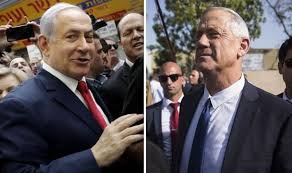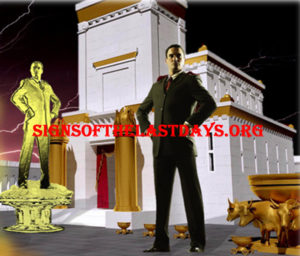The Israeli election is now up in the air as to who won, with both Netanyahu and his challenger the political neophyte Benny Gantz, both claiming victory.
The current exit polls show the race is a dead heat with both deadlocked with about the same number of seats won in the Knesset. So how will it be determined who is the next Prime Minister of Israel?
There are three stages to an Israeli election: first is the voting by the Israeli people for the parliament seats to be filled; then secondly, the selection of the potential prime minister by the Israeli President; and thirdly, there are then coalition negotiations by the prime-minister-designate to form a government coalition with a parliamentary majority in the 120 seat Knesset.
But if the prime-minister-designate fails to put together a coalition with a majority, then Israel’s President can designate someone else to have a go at it. So given the process, and that Israel is in the first step, it may be a while before the next Prime Minister is finally determined.
And given that in the first step the election seems to be a virtual tie, the next two steps become critical; and with the current Israeli political environment being as it is, these next two steps are ripe for controversy.
In Israel the president is elected by the Knesset as a ceremonial head of state role, whereas the prime minister has executive power actually leading the government.
But one very important role the Israeli President has is in that second stage of the Israeli election in selecting who the prime-minister-designate will be from the parliament election; and the President can chose whomever they want from the 120 newly elected Members of the Knesset or the MKs.
 If there is a clear majority for a candidate for Prime Minister, then the President will almost certainly task that candidate with building a coalition. But if its close as this election is, without a significant majority, there is no clear guideline as to how the President must decide who to designate. Other than for the President to choose whomever they think can best form a coalition for a majority government.
If there is a clear majority for a candidate for Prime Minister, then the President will almost certainly task that candidate with building a coalition. But if its close as this election is, without a significant majority, there is no clear guideline as to how the President must decide who to designate. Other than for the President to choose whomever they think can best form a coalition for a majority government.
And an element for controversy in this Israeli election is that Israel’s current President Rivlin has openly disagreed and clashed with Netanyahu; they do not like each other.
And in this close race, Netanyahu is concerned that President Rivlin might exhibit independence and lets say some creativity in making his selection for prime minister.
The conflict between these two has come very much into the open, even during the election. It’s reported that Netanyahu has been heard to say that President Rivlin is just looking for an excuse to give Gantz a go at stringing together a governing coalition.
Then President Rivlin, when hearing he was accused of plotting to choose someone besides Netanyahu to form a government, he condemned Netanyahu’s remarks in an official statement from his office;
Calling them a “despicable attempt to harm the public’s trust in the president’s decision after the elections.” So there is serious conflict between these two. So in this close race, when Rivlin makes his choice, look for potential fireworks.
Then after a prime-minister-designate is selected by the President, in the third step comes the wheeling-and-dealing to put together a majority coalition. Here in this step, it seems the smaller parties that reach the Knesset may wield significant influence.
This step will involve serious negotiations with the prime-minister-designate promising government positions and bargaining on policy decisions so to get other parties to throw their support and seats behind them.
 And here in the process of this step is where whomever the designee is, whether it’s Netanyahu or Gantz, could find themselves having to make promises to parties with nationalist or religious agendas so to get their support for a coalition which in time may surprise.
And here in the process of this step is where whomever the designee is, whether it’s Netanyahu or Gantz, could find themselves having to make promises to parties with nationalist or religious agendas so to get their support for a coalition which in time may surprise.
And these negotiations and their resulting deals could have potential impacts coming sooner or later that can further push Israel toward its Biblical prophetic destiny.
So these next days in the Israeli political process should be watched closely, they can have heavy prophetic import for the Last Days.
This much we know from the Daniel 9:27 prophecy, that at some time in the future there will be a government in Israel for whatever their reasons that will seriously enter negotiations; ultimately making a 7 year agreement in the Mid-East which helps bring about the Last Days Temple at Jerusalem and also the rise of the antichrist.
The Biblical prophecies (Zechariah 14, Daniel 9) foretell that Israel and Jerusalem will become the focus of the world in the Last Days signaling we are nearing the end of this age and the coming of Jesus Christ.
This ministry is viewer supported: if each of our viewers would give a donation, no matter the amount, as a tax-deductible offering, you will help ensure the signs of Biblical prophecy continue to be shared with the world. Please Give Here so together we can continue sharing more signs of the coming of Jesus.
Do you believe in ministry sharing the prophetic signs of Jesus’ coming? … then please join us as a monthly Partner in Prophecy giving any amount each month to share the signs of His coming. Just check the recurring contribution button on the giving page linked below:
Click below to give any amount as
A Monthly Partner. (on form be sure to click recurring contribution button)
Thank you to all who are giving to this work of ministry, you will be blessed as Lord Jesus said!
Contributions to this non-profit charity are tax-deductible.

